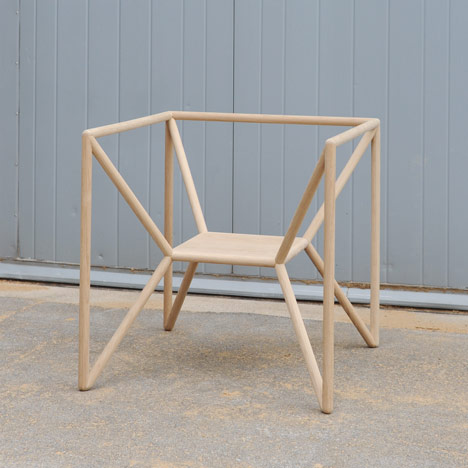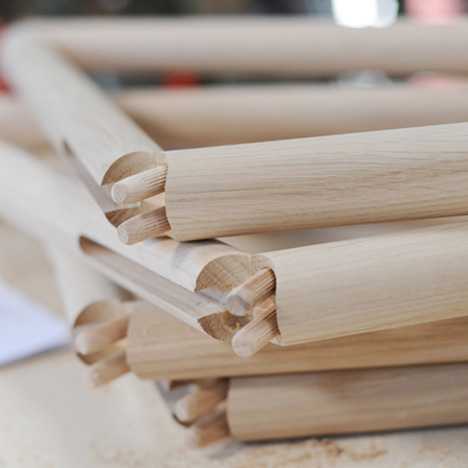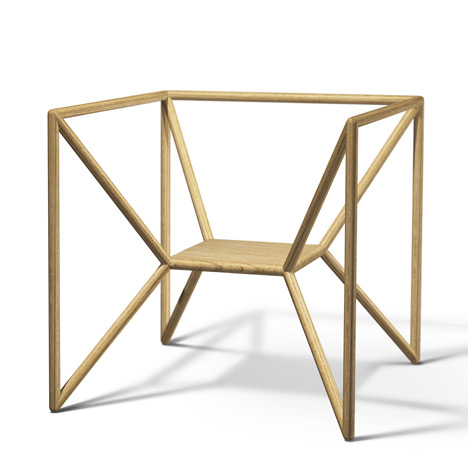M3 Chair by Thomas Feichtner
Vienna Design Week 2011: Vienna Design Week opens tomorrow and local designer Thomas Feichtner will present his chair with a seat suspended at the centre of a cubic oak frame.

The M3 Chair measures one metre on each side, with diagonal struts connecting the outer corners to its square seat.

Produced in the workshops of Austrian company Neue Wiener Werkstätte, the chair will be on show at Theresiengasse 6, 1180 Vienna. Here's a film about the making of the chair:

More coverage of Vienna Design Week to come - meanwhile you can watch a preview film on Dezeen Screen.
Thomas Feichtner will also appear on Dezeen Platform at Dezeen Space on 12 October - see the ful lineup here.
The details below are from Thomas Feichtner:
M3 Chair -Thomas Feichtner
For Vienna Design Week 2011, Neue Wiener Werkstätte will be showing the M3 Chair developed specifically for this exhibition by Austrian designer Thomas Feichtner. This unique object will be juxtaposed with the mass-produced FX10 Lounge Chair, an earlier work by Feichtner which has since become a classic of Austrian design. While these two pieces share a geometric theme, the M3 Chair exhibits an open, wooden cantilever construction that contrasts with the closed body of the Lounge Chair. The installation highlights not only the tension between closed and open, heavy and light, surface and line, and mass-production and the single copy, but also the symbiosis between traditional workmanship and contemporary design. These pieces thus embody Neue Wiener Werkstätte’s ideal of hand-producing technically perfect individual products built to last generations, furniture designed to guarantee historical recognizability—the perfect union of hand-craftsmanship, tradition and design.
Liberated from the demands normally made on a mass-produced item, this design experiments with functionality, structural engineering and material. Both its back and its armrests are mere tangents of the construction, the functions of which are only discovered via actual use. With a seating surface floating within the construction and legs extending far to the sides, the M3 is most assuredly not a chair that saves space—it is much rather one which creates a space. The dimensions of the M3 measure one cubic meter, standing for a conscious way of appropriating one’s own space. Hence the “m3” reference in the name M3 Chair. It is only via the chair that the open space is defined.
The chair is made of one and only one material: oak. This is a conscious choice of materials, harkening back to the woodworking tradition upheld by furniture workshops of yore. The wood renders the chair’s light construction a static experiment which could only succeed in a handmade, unique item. Like many works by Feichtner, the M3 is to be understood as an artistic and experimental examination of design removed from industry and mass-production, as art and design placed in interdisciplinary dialog with one another. The M3 experiment is particularly well-suited to showing that design can free itself from the doctrine of the purely objective and is not automatically obligated to serve industrial utility. It represents a catalyst for the discussion of various positions. The M3 is a contribution to the design festival of the City of Vienna.
Thomas Feichtner was born in Brazil in 1970. After attending school in Düsseldorf, Germany, he earned a degree at the University of Art and Industrial Design in Linz, Austria, where he also became an instructor a few years later. After completing studies in industrial design, he founded his own design office. Feichtner initially designed industrial goods and numerous products for the Austrian sports industry, and was honoured with international design awards like the IF Design Award, the Swiss Design Prize, the Cannes Lion (nomination), the German Design Prize, the red dot design award, the European Design Award and the Josef Binder Award. Besides his activity as a product designer for Head, Tyrolia, Fischer and Blizzard, Feichtner also worked in the area of visual communications for the likes of Swarovski Optik, Adidas Eyewear or the British-Israeli designer Ron Arad.
His later work focused on artistic aspects and took a more experimental approach. In search of an independent mode of operation that went beyond globalization and mass production, he designed products for such traditional crafters as J&L Lobmeyr, Neue Wiener Werkstätten, Wiener Silber Manufactur, Augarten Porzellanmanufaktur and Stamm, and realised freelance projects in cooperation with Vitra and FSB. International exhibitions at the Triennale di Milano, the National Gallery in Prague, the Biennial of Industrial Design in Ljubljana, the Design Center Stuttgart, the Gansevoort Gallery in New York, Design Week in Tokyo as well as the Museum for Applied Arts (MAK) in Vienna followed. His works have been acquired by various design collections. Feichtner is a professor for product design at the Muthesius Academy of Fine Arts and Design in Kiel, Germany. He lives and works in Vienna with his wife Simone Feichtner.